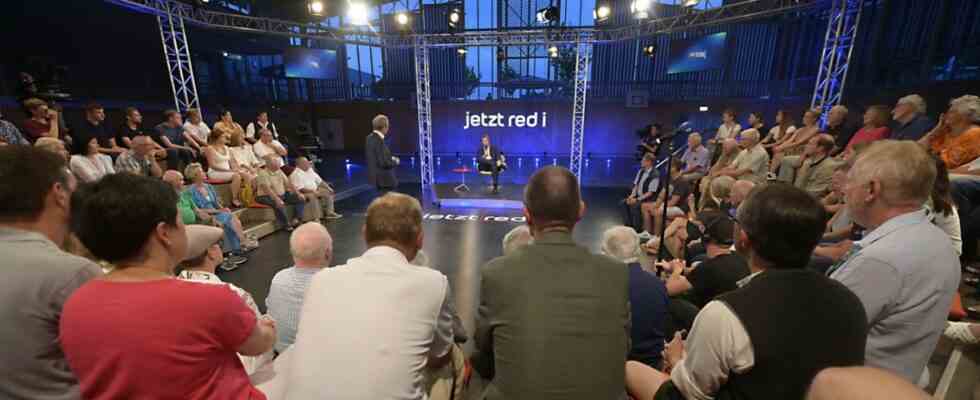It’s hot in the multi-purpose hall at Otterloher Feld in Sauerlach this Wednesday evening. It’s still more than 30 degrees during prime time. And yet the coming winter hovers like the sword of Damocles over the arena that Bayerischer Rundfunk has set up here outside the gates of Munich. He’s worried, says Stefan Bauer. He is a master baker and confectioner in the Ratschiller business a little further south in Holzkirchen. A pretzel still costs 75 cents there, but will it stay that way? The bakery has to pay around 18,000 euros more for gas after signing new contracts with the energy supplier – a month. The price of flour is also exploding, says Bauer. A few meters away in an armchair, Prime Minister Markus Söder nods with worry lines on his forehead.
The Ayinger brewer Franz Inselkammer takes care of the energy supply.
(Photo: Claus Schunk)
Söder came to Sauerlach to answer the questions of the citizens on the BR program “Now red i” – and at the beginning the gas crisis, the rising energy prices, the fear of shortages in the cold months dominated the Discussion. Like the baker Bauer, who fears the quotas for the raw material, Franz Inselkammer, head of the brewery in neighboring Aying, also says that he is most concerned about the energy supply, in addition to the labor market, which has also been emptied by the corona pandemic. His family had already taken the oil tank out of the mothball and filled it, says Inselkammer when asked by BR moderator Tilmann Schöberl; but as an alternative, he would only get the family business, including a tavern with around 200 employees, through a month. And that despite the fact that they had done a lot to reduce consumption in the past decades: with a combined heat and power plant and photovoltaic systems. “But we still have a problem without gas,” says Inselkammer.
Prime Minister Markus Söder is also faced with uncomfortable questions – for example about the second regular route.
(Photo: Claus Schunk)
Yes, says Söder, the country must prepare for a difficult winter, the worst case scenario must be assumed: “Putin turns the gas tap on and off.” When Inselkammer asked what Bavaria could do about the gas supply itself, Söder said the federal government was responsible for this. Söder reports on a conversation with the Federal Network Agency, which is responsible for rationing gas supplies in the event of a crisis. In this conversation, according to Söder, he made it clear that Bavaria would not accept special shutdowns of certain regions, as they have already been discussed. According to the prime minister, smaller companies in particular would probably never recover from such shutdowns: “It’s like a stroke for the economy.”
With regard to the federal government, Söder says he does not understand that Italy manages to secure its gas supply, but Germany does not. And of course he renewed his demand to keep the nuclear power plants connected to the grid – but at the same time committed himself to the rapid expansion of renewable energies. “Warm apartments, affordable groceries – and also beer. And a secure energy supply are the basic tasks,” said Söder in the direction of the baker Bauer and brewer Inselkammer.
Pensioner Günther Deger reports on real existential problems
Günther Deger describes how much the fear of rising prices extends into society and what effects inflation is already having. He and his wife, says the pensioner, now have real existential concerns because of rising energy prices. You would only have received an additional cost statement with a high additional demand and further price increases had been announced. The consequence for the couple: Both would only shower twice a week and only buy groceries on sale.
The couple receives support from the association “Ein Herz für Rentner”, whose founder Sandra Bisping in Sauerlach reports that the association receives “many, many new applications” from older people for support every day. Söder says it is clear that there must be support from the state. He describes it as “absurd” that pensioners and students are excluded from the federal government’s aid packages. https://www.sueddeutsche.de/muenchen/landkreismuenchen/.
Follows the discussion in silence: Straßlach’s mayor Barbara Bogner.
(Photo: Claus Schunk)
But the people in Sauerlach are also concerned with other issues. FDP district councilor Katharina Diem from Kirchheim confronts Söder with the explosion in costs and the immense delays in the construction of the second main S-Bahn line, about which the Prime Minister had apparently been informed for a long time. According to Diem, so much money has already been “sunk” into the project that it makes no sense to cancel it now. But the disaster must be analyzed in detail. All of these projects, Söder replies, take longer and “unfortunately” also cost more. In 2019 he was informed that the railways wanted to completely replan the project, and the state capital also wanted to integrate the U 9. But Söder also criticizes Deutsche Bahn, which sometimes acts like a state within a state.
Nevertheless, the Prime Minister is committed to the main route. This is particularly important for “connecting the entire surrounding area”. And since Söder is already on the subject of traffic, he says he wants to continue on the path to a uniform 365-euro ticket. First of all, however, it remains to be seen what the federal government will propose as a successor to the nine-euro ticket. The survey is over after an hour – and it’s still very hot in Sauerlach.

